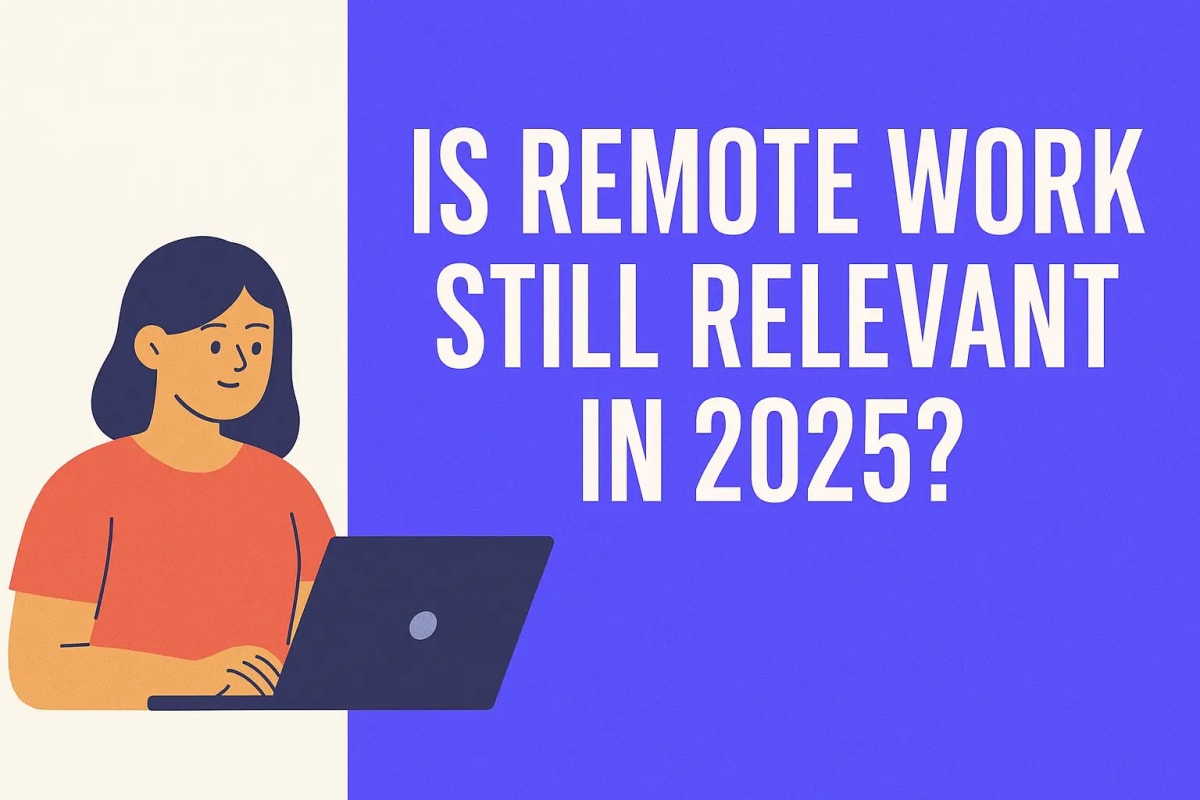
Is Remote Work Still Relevant in 2025? Trends and Reality
While remote work has benefits, it's not without hurdles. The good news? Many organizations are finding innovative ways to overcome them.
News & Niche
The global workforce has witnessed one of the most dramatic transformations in modern history over the last five years. What began as a response to a global crisis in 2020 has now evolved into a new way of working. As we step into 2025, a pressing question looms large across industries, boardrooms, and coffee tables alike: Is remote work still relevant?
While some companies are pushing employees back into the office, others are doubling down on distributed teams and borderless hiring. But beyond corporate decisions and buzzwords lies a deeper reality — a shift in mindset, technology, and lifestyle that continues to redefine work. In this comprehensive analysis, we explore whether remote work is still practical, desirable, and effective in 2025.
What Makes Remote Jobs Relevant in 2025?
Remote work was once seen as a temporary fix, a way to survive a global pandemic. However, by 2023, it had become a staple for many companies, especially in tech, finance, and creative sectors. Fast forward to 2025, and we now see a more nuanced picture.
Remote Work Trends You Should Know
Employees increasingly prioritize flexibility over geographic freedom. Remote work is no longer about working from anywhere, but about having control over when, where, and how they work. This trend has given rise to terms like "hybrid remote," "asynchronous teams," and "location-flexible roles."
Hybrid Work Dominates
While fully remote companies still exist, the majority have embraced a hybrid model. According to a 2025 report by the Global Workforce Index, over 62% of companies with over 100 employees now offer hybrid work arrangements. Employees may spend 2-3 days in the office and the rest working from home or a co-working space.
Benefits and Drawbacks of Remote Work
Despite the return-to-office movement in some sectors, the core advantages of remote work remain highly relevant.
Increased Productivity
Numerous studies have shown that remote employees often work more efficiently. In 2024, a study by Harvard Business Review found that remote employees clocked in 20% more focused hours compared to their in-office counterparts. Fewer meetings, less office chatter, and personalized work environments contribute to this boost.
Cost Savings for Companies and Employees
Businesses continue to save on overhead costs — rent, utilities, equipment — while employees save on commuting, food, and wardrobe expenses. These savings often translate to better resource allocation and employee benefits.
Access to Global Talent
Remote work enables companies to hire from a borderless talent pool. This not only improves diversity but also helps find niche skill sets that might not be available locally.
Challenges and Solutions for Remote Work in 2025
While remote work has benefits, it's not without hurdles. The good news? Many organizations are finding innovative ways to overcome them.
Communication Gaps
One of the biggest challenges is communication. In-person chats and quick clarifications are harder to replicate remotely. However, platforms like Slack, Microsoft Teams, and Notion have stepped up with features that encourage both real-time and asynchronous communication.
Team Bonding and Culture
Remote teams often struggle with building culture. In 2025, companies are addressing this with virtual team retreats, gamified onboarding, and monthly digital hangouts. Some even organize quarterly in-person meetups to strengthen relationships.
Burnout and Work-Life Balance
Paradoxically, remote workers can sometimes work more than in-office employees, blurring the line between work and personal life. To combat this, many companies now offer:
Clear "no meeting" hours
4-day work weeks
Mandatory wellness breaks
Skills You Need to Thrive in Remote Work
To remain competitive in remote job markets, professionals need more than just discipline. Skills like asynchronous communication, self-management, and tool fluency are essential. Familiarity with project management platforms, document collaboration tools, and cloud-based software is now expected.
Where to Find Remote Jobs in 2025
The best way to land a remote job is to explore platforms dedicated to such opportunities. From freelancing to full-time positions, here are some top platforms:
Upwork
Fiverr
Toptal
We Work Remotely
Remote OK
FlexJobs
LinkedIn (Remote filter enabled)
Remote Work vs Office Work: A 2025 Comparison
Remote work and office work each have their pros and cons. In 2025, professionals and employers are reevaluating what works best for productivity, employee well-being, and business growth.
The Role of Technology in Remote Work Success
Remote work wouldn't be sustainable without tech — and in 2025, technology is smarter, faster, and more collaborative than ever.
AI-Powered Collaboration
Artificial Intelligence now plays a crucial role in scheduling, project tracking, and content summarization. Tools like Notion AI and ClickUp AI help teams stay on track with minimal human friction.
Immersive Meetings
Virtual Reality (VR) and Augmented Reality (AR) have begun to replace traditional video calls. While not yet mainstream, early adopters are using platforms like Meta Horizon Workrooms for more immersive and interactive meetings.
Cybersecurity in a Remote World
As remote teams grow, so do security concerns. Companies are investing heavily in zero-trust architectures, endpoint security tools, and employee training to protect sensitive data across distributed networks.
Who's Still Hiring for Remote Jobs?
Not all sectors view remote work equally. Here's a snapshot of where remote work is thriving in 2025:
Tech and SaaS
Remote-first by nature, many tech companies continue to lead the way with flexible policies and remote collaboration tools.
Creative and Content Industries
Writers, designers, video editors, and content strategists often work independently, making them ideal for remote settings.
Customer Support and Virtual Assistants
With AI handling first-level queries, human agents manage escalations — all from the comfort of their homes.
Online Education and Coaching
With the e-learning boom, educators and coaches deliver lessons, webinars, and one-on-one sessions from anywhere.
Employee Preferences: What Workers Want in 2025
Yes — overwhelmingly so. In a 2025 LinkedIn survey, 76% of professionals said they would consider switching jobs if offered more flexibility. The reasons include:
Better family time
Avoiding long commutes
Improved mental health
Freedom to travel
Interestingly, younger workers (Gen Z and Millennials) see remote work as a standard expectation, not a perk.
FAQs About Remote Work in 2025
-What are the top-paying remote jobs in 2025?
Some of the highest paying remote jobs include AI engineer, product manager, UX designer, and data scientist — many of which offer $100K+ salaries.
-Are entry-level remote jobs available?
Yes. Roles like customer support, virtual assistant, and junior content writer are perfect for beginners entering the remote workforce.
-What’s the best site to find a remote job?
Platforms like FlexJobs, Remote OK, and Upwork are top choices in 2025, each with niche advantages.
-How can I avoid scams when applying for remote jobs?
Stick to well-known job boards, never pay to apply, and research each company thoroughly.
-Can I negotiate benefits for a remote role?
Absolutely. You can and should negotiate for internet stipends, flexible hours, home office setup, and even travel budgets.
Remote Work Is Not Just Relevant — It's Evolving. So, is remote work still relevant in 2025?
Absolutely. But it's no longer just about working from home. It's about freedom, balance, and autonomy — powered by smarter tools, better culture strategies, and a more enlightened workforce.
As we look ahead, the future of work is not defined by location, but by results, trust, and well-being. Companies that understand this shift will attract top talent and thrive in the next generation of work.
Whether you're a job seeker, an entrepreneur, or a business leader — remote work in 2025 isn't a trend to chase, it's a reality to embrace.
